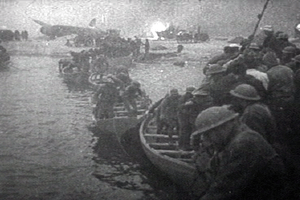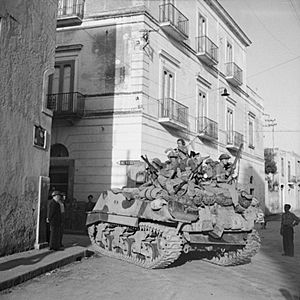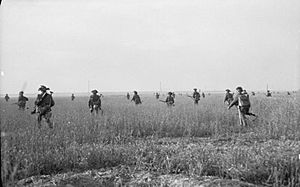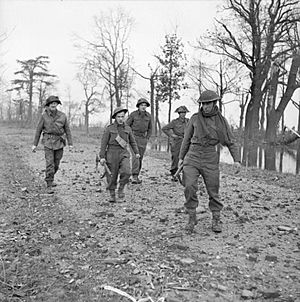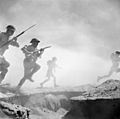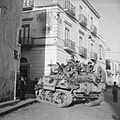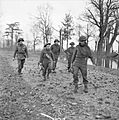Lashmer Whistler facts for kids
Quick facts for kids
Sir Lashmer Whistler
|
|
|---|---|
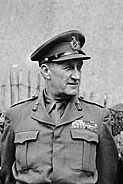 |
|
| Nickname(s) | "Bolo" "Private Bolo" |
| Born | 3 September 1898 Kasauli, Ambala District, Punjab, British India (now in Solan district, Himachal Pradesh, India) |
| Died | 4 July 1963 (aged 64) Cambridge Military Hospital, Hampshire, England |
| Allegiance | United Kingdom |
| Service/ |
British Army |
| Years of service | 1916–1957 |
| Rank | General |
| Service number | 13017 |
| Unit | Royal Sussex Regiment |
| Commands held | Western Command (1953–57) West Africa Command (1951–53) Northumbrian District and 50th (Northumbrian) Infantry Division (1950–51) 3rd Infantry Division (1944–47) 160th Infantry Brigade (1944) 131st Infantry Brigade (1942–44) 132nd Infantry Brigade (1942) 4th Battalion, Royal Sussex Regiment (1940–42) |
| Battles/wars | First World War Russian Civil War Arab revolt in Palestine Second World War Palestine Emergency |
| Awards | Knight Grand Cross of the Order of the Bath Knight Commander of the Order of the British Empire Distinguished Service Order & Two Bars Mentioned in Despatches (4) Commander of the Order of the Crown (Belgium) Croix de guerre (Belgium) Grand Cross of the Order of the House of Orange (Netherlands) |
| Other work | Chairman, Committee on the New Army (1957) |
General Sir Lashmer Gordon Whistler (3 September 1898 – 4 July 1963), also known as "Bolo", was a brave British Army officer. He fought in both the First World War and the Second World War. During the Second World War, he worked closely with Field Marshal Sir Bernard Montgomery. Montgomery thought Whistler was one of the best infantry commanders he knew.
Even though Whistler didn't go to the special Staff College, which was usually needed for high ranks, he became a full general. This showed that with enough skill and leadership, anything was possible.
Contents
Early Life and Army Start
Lashmer Whistler was born in British India in 1898. His father was also a soldier. Lashmer moved to England as a baby with his mother and older brother. He went to St Cyprian's School and Harrow School, where he was a great sportsman, especially in cricket.
In 1916, when he was 18, he joined the Royal Military College, Sandhurst. This was during the First World War. He became an officer in the Royal Sussex Regiment in 1917. He fought on the Western Front in France. He was hurt twice. The second time, in 1918, he was captured by the Germans and became a prisoner of war (POW). He even tried to escape from a train but was caught again. He lost a lot of weight and was very weak by the end of the war.
Between the Big Wars
After the First World War ended in 1919, Whistler stayed in the army. He was promoted to lieutenant. He also volunteered to fight in the Russian Civil War in Russia. He told many stories about the "Bolsheviks," which led to his nickname "Bolo."
He served in different places, including Ireland and Hong Kong. He also learned Italian. In 1929, he became a temporary captain. It took him 21 years to become a major in 1938. Just before the Second World War started, he was in Palestine during the Arab revolt. Whistler had thought about leaving the army because he didn't expect to get a higher rank.
Second World War Battles
Fighting in France and the Dunkirk Escape
The Second World War began on Whistler's 41st birthday, 3 September 1939. In February 1940, he became a lieutenant colonel and took charge of the 4th Battalion, Royal Sussex Regiment. His battalion went to France to join the British Expeditionary Force (BEF).
A month later, the German army attacked. Whistler's battalion faced heavy bombing. He famously asked for "half a Hurricane for half an hour" to fight back. During the Battle of France, he stood bravely in the middle of the street while bombs fell around him. His strong leadership meant the Germans bypassed his position. For his courage, he received the Distinguished Service Order (DSO).
His unit had to withdraw to Dunkirk and most of them escaped to England. Whistler became known as "The Man who went Back to Dunkirk." He returned to look for missing soldiers, showing his dedication.
For the next two years, his division defended Kent from a possible German invasion. Both Lieutenant-General Bernard Montgomery and Major General Brian Horrocks noticed Whistler's great leadership skills. Montgomery said he knew Whistler was "well above the ordinary run of battalion commanders."
North Africa Campaigns
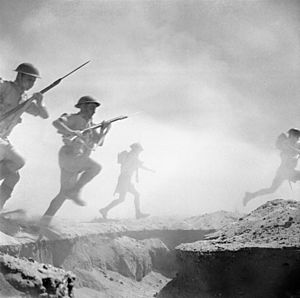
In May 1942, Whistler's division went to Egypt. In August, he joined the British Eighth Army in North Africa. He temporarily took command of a brigade (a large group of soldiers). In September, he was promoted to brigadier. He led the 132nd Infantry Brigade during the Second Battle of El Alamein, where he was slightly wounded.
As the army advanced, Whistler was transferred to command the 131st Lorried Infantry Brigade in December 1942. This brigade was part of the famous 7th Armoured Division, known as the "Desert Rats." Whistler led his troops through many battles, including the capture of Tripoli. He often visited the front lines, which earned him the nickname "Private Bolo." The fighting in North Africa ended in May 1943. Whistler received a special award (a bar to his DSO) for his services.
Fighting in Italy
In September 1943, Whistler and his brigade joined the Salerno landings. They faced very tough fighting. After the city of Naples was freed, they crossed the River Volturno in a difficult night battle. Whistler, looking very tired, even met General Dwight D. Eisenhower, the top Allied commander.
In November, the 7th Armoured Division was sent back to the United Kingdom to prepare for the invasion of France. Montgomery chose them for this important task. Whistler received another special award (a second bar to his DSO) for his work in Italy.
Normandy and North West Europe
In January 1944, Whistler was told he would command the 160th Infantry Brigade. Montgomery praised him, saying he was "the best and most experienced Brigadier in the British Army."
Just a week after D-Day (6 June 1944), the commander of Montgomery's old division, the 3rd Infantry Division, was wounded. Montgomery immediately gave Whistler command of this division, making him an acting major-general.
Whistler led the 3rd Division throughout the campaign in north-west Europe. His division helped capture Caen in July. They then moved through France, capturing Flers in August. On his 46th birthday, 3 September, the division began a 150-mile advance. They also took part in Operation Market Garden and the difficult Battle of Overloon. One soldier noted how Whistler inspired his troops: "Every man stood up and waved to him as he went past, laughing and waving in reply."
For several months, the 3rd Division held the line along the Maas River. In March 1945, they reached the River Rhine. Whistler's headquarters were visited by Winston Churchill, the British Prime Minister. From 27 to 30 March, the division crossed the Rhine and headed towards the River Elbe, facing strong resistance. They captured the city of Bremen in April.
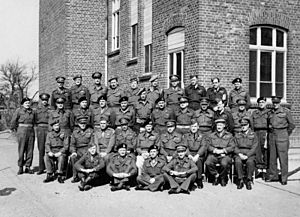
After Germany surrendered and the end of World War II in Europe came, Whistler was sent to Osnabrück to help manage a large area of Germany. He was in charge of about 260,000 displaced people and had to restore order. He was promoted to colonel and then temporary major general.
After the Second World War
Leading the Imperial Strategic Reserve
Even though Whistler hadn't gone to Staff College, his amazing leadership during the war led him to many important command jobs after the war. His division became the Imperial Strategic Reserve, ready to go anywhere in the world quickly. In November 1945, Whistler took his division to Egypt and then to Palestine to help with problems between Israelis and Arabs. He became the commander of British Troops in Egypt.
Helping Countries Become Independent
In 1947, Montgomery chose Whistler to be the General Officer Commanding British Troops in India. His main job was to safely remove British army units from India as the country gained independence. He left Bombay with the last British unit in February 1948.
Next, in 1948, Whistler became the Commander-in-Chief in Sudan. He also had a special title, Kaid of the Sudan Defence Force. He worked to train Sudanese people to take over the defense force. In 1951, he became the General Officer Commanding-in-Chief of West Africa Command. He was promoted to lieutenant general.
His headquarters were in Accra, where he commanded troops in Nigeria, Sierra Leone, Gold Coast, and Gambia. As these countries were becoming independent, Whistler focused on training African soldiers to lead their own armed forces. He was knighted in 1952. He sent young African soldiers to military colleges like Sandhurst.
Western Command in England
In 1953, Whistler was offered command of Western Command in England. He became the Colonel of the Royal Sussex Regiment. His main goals were to work with local authorities, support the Territorial Army (a volunteer reserve force), and encourage new officers. In 1954, he was chosen to be an Army Commander if a war broke out in Europe. He was promoted to full general in July 1955. He retired from the army in February 1957.
Retirement and Later Life
After retiring, Whistler became Chairman of a committee to reorganize the British Infantry. He also chaired another committee to look into army discipline and training.
He was appointed Deputy Lieutenant for the County of Sussex in 1957. He also became Colonel Commandant of the Royal West African Frontier Force, being the last British officer to hold this role. The governments of Nigeria and Sierra Leone also made him an Honorary Colonel of their military forces. Whistler was good friends with Kwame Nkrumah of Ghana and gave him advice.
Whistler was very interested in small-bore rifle shooting. He became Vice-President and then Chairman of the National Smallbore Rifle Association. He also led the British team at the World Championships in Moscow, where they won titles. He supported the Chichester Rifle Club, which still holds a trophy in his memory.
Whistler's last challenge was against lung cancer. He passed away on 4 July 1963, at the age of 64.
Personal Life and Legacy
Brigadier Sir John Smyth wrote Whistler's biography. He noted four main qualities in Whistler: his humility (being humble), his humanity (being kind), his sense of humor, and his love for his family. Smyth said Whistler was a "very human man" who also had "very high ideals and Christian principles." He often asked his chaplains to hold short services before battles.
Whistler married Esmé Keighley in 1926. They had two daughters.
The Duke of Norfolk, who served under Whistler, called him "possibly the greatest man I ever knew."
Kwame Nkrumah wrote that "General Whistler was not only a great soldier, but a great man; he was to me a most sincere friend, frank and understanding, jovial and abounding in energy."
Images for kids
 | Shirley Ann Jackson |
 | Garett Morgan |
 | J. Ernest Wilkins Jr. |
 | Elijah McCoy |


